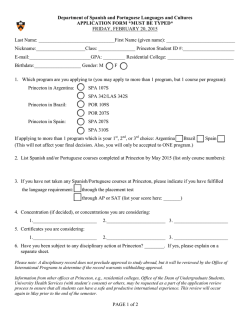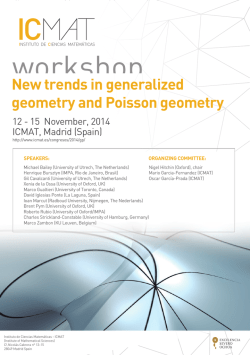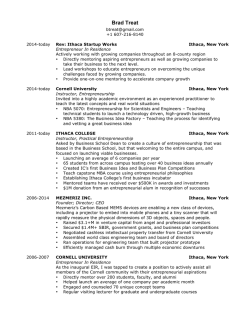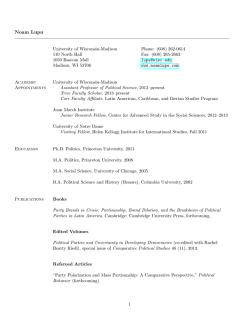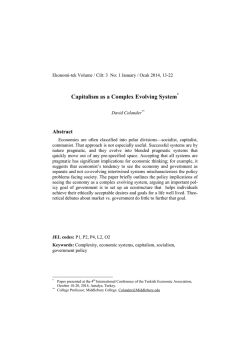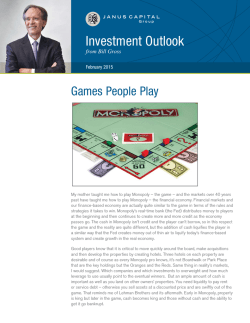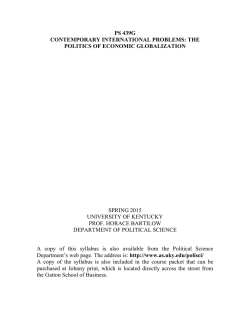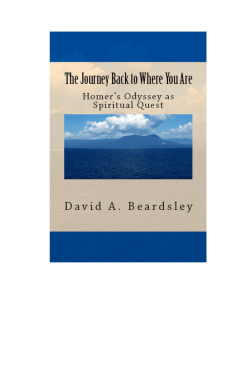
Plan de cours
Sciences Po Formation commune – Master Spring Semester 2014-‐15 IFCO2260 International Political Economy Cornelia Woll Instructor: Cornelia Woll, Professor of Political Science, [email protected] Teaching Assistant: Francesco Findeisen, PhD Student in Sociology, Max Planck Sciences Po Center, [email protected] or [email protected] (for mid-‐term assignments) Course description The global economy is the historic result of political decisions, but it also shapes politics and society in very specific ways. This course proposes a multidisciplinary perspective on the evolution of the global political economy and its effects on national politics. Based on insights from political science, sociology, anthropology, economics and history, we will study what may appear as rather technical issues in macroeconomics. We will cross the boundaries between economics and politics and move from the national to the international arena and back. Student will gain familiarity with social science theory on some of the most fundamental tensions in the global economy, in particular from the developing field of international political economy. We will study how the current economic order evolved historically; debate international economic issues from a variety of perspectives, in particular monetary systems and capital mobility, trade, investment and production, finance and economic development; and analyze the effects of integration on national politics, economic equality and the environment. The objective of the course is to understand the linkages and tension between democracy and capitalism, between national variation and international integration, and to study wealth, inequalities, community, and nature in the global economy. Pedagogical format This is a 24h lecture course in English. The teaching assistant will organize occasional work sessions to help students with their assignments and the preparation of the final exam. Throughout the course, all academic honesty rules apply. Please be sure to use proper citation and bibliographic references for all written work. Course requirements There will be two requirements: a mid-‐term essay accounting for 40%, and a final exam accounting for 60% of the final grade. In addition, all students are expected to do the weekly assigned required readings. They will allow preparing students for the class, follow the lectures more easily and gather the knowledge necessary for succeeding the final exam. 1 / 12 The mid-‐term essay is a five-‐page (2000 words) critical essay on one of the recommended readings for one of the classes. You should discuss the reading, link it with major topics in contemporary debates and pose questions you think are insufficiently addressed in the text. Recommended readings comprise both scientific research in the social sciences and non-‐ scientific books that have marked the discussion on globalization. For both, it is essential that you situate the text in its context, explain the particular perspective of the author and discuss the limitations of the arguments made. In grading, we will put a particular emphasis on your analytical perspective, not just the quality of the synthesis. Writing on an academic book will be more straightforward since it will be easier to situate the book within an academic debate, but you will find the reading itself more demanding. Non-‐academic books might be more straightforward to read, but more challenging to critically assess and relate to academic debates. Mid-‐term essays are due within 3 weeks after the lecture covering the respective topic and readings was held. Example: the first session you can chose to write your essay on is the second one, held on February 3, 2015 (“Invention of the Economy”). Essays on the readings of this class will be due on February 24, 2015. Essays have to be handed in electronically via Urkund (please use [email protected]) and will not be accepted after the respective three week deadlines. If you cannot make a deadline, you have to choose a subsequent topic. The last possible deadline is on May 19, for readings related to our last session (“Nature”, April 28). The final exam is a two-‐hour in class written exam. You will not be allowed to use class material or electronic devices during the exam. Readings Required and recommended readings are indicated for each session. In addition, the following references are recommended for students seeking to get a general overview. General introduction: • Broome, Andre. 2014. Issues and Actors in the Global Political Economy. London: Palgrave Macmillian. • Clift, Ben. 2014. Comparative Political Economy: States, Markets and Global Capitalism. London: Palgrave Macmillian. • Moschella, Manuela, and Catherine Weaver. 2013. Handbook of Global Economic Governance: Players, Power and Paradgims. London: Routledge. • Oatley, Thomas. 2011. International Political Economy: International Edition. 5th ed. Harlow: Pearson. • O’Brian, Robert, and Marc Williams. 2013. Global Political Economy: Evolution and Dynamics. 4th ed. New York: Palgrave Macmillian. • Ravenhill, John. 2014. Global Political Economy. 4th ed. Oxford: Oxford University Press. 2 / 12 An intellectual history of the field : • Blyth, Mark. 2010. Routledge Handbook of International Political Economy (IPE): IPE as a Global Conversation. London: Routledge. • Cohen, Benjamin J. 2014. Advanced Introduction to International Political Economy. Cheltenham: Edwards Elgar. Outline 27 January 2015 1. Introduction: What is the International Political Economy? This session will present the great underlying questions of the class, present the field of international political economy and discuss its theoretical paradigms. We will also distinguish different types of intellectual traditions that will accompany us throughout the semester. Required readings • Oatley, Thomas. 2011. International Political Economy: International Edition. 5th ed. Harlow: Pearson. • Watson, Matthew. 2014. “The Historical Roots of Theoretical Traditions in Global Political Economy.” In Global Political Economy, ed. John Ravenhill. Oxford: Oxford University Press, 29–66. Part I: The Path to the Current Global Economy 3 February 2015 2. The Invention of the Economy Today’s markets function as if they were self-‐evident, but every piece of economic action is socially constructed and has evolved over time. We will discuss insights from economic anthropology and history about the origins of economic rationalities, the fundamental elements in functioning markets and the evolution of economic thought over time that make our current economic system possible. Required readings • Heilbroner, Robert L. 1999. “The Economic Revolution.” In The Worldly Philosophers: The Lives, Times, and Ideas of the Great Economic Thinkers, New York: Touchstone, 18–41. • Polanyi, Karl. 1971. “The Economy as a Situated Process.” In Trade & Market in the Early Empires, eds. Karl Polanyi, Conrad M. Arensberg, and Harry W. Pearson. Chicago: Henry Regnery Company, 243–70. Recommended readings • Bourdieu, Pierre. 2005. The Social Structures of the Economy. Cambridge: Polity Press. • Desrosières, Alain. 2002. The Politics of Large Numbers. A History of Statistical Reasoning. Cambridge: Harvard University Press. 3 / 12 • • • • Fontaine, Laurence. 2014. The Moral Economy: Poverty, Credit, and Trust in Early Modern Europe. Cambridge: Cambridge University Press. Marx, Karl. [1867] 1992. “Chapter 3: Money, or the Circulation of Commodities.” In Capital: Volume 1: A Critique of Political Economy, London: Penguin Classics, 188– 246. Thompson, E. P. 1963. The Making of the English Working Class. London ; New York: Penguin Books. Weber, Max. [1905] 2002. The Protestant Ethic and the Spirit of Capitalism: And Other Writings. London: Penguin Classic. 10 February 2015 3. Forging a World Economy 14th-‐19th Century The historical roots of the global economy go back for many centuries, with different phases of integration across regions. We seek to understand the differential developments of separate parts of the world, how they began exchanging with one another and in which ways they came to dominate one another. This session reviews the succession of empires and their economic set-‐up, the global history of a variety of commodities, and hegemonic stability, with a specific set of hierarchies associated in each different period. Required readings • Braudel, Fernand. 1977. Afterthoughts on Material Civilization and Capitalism. Baltimore: The Johns Hopkins University Press. • Marx, Karl, and Friedrich Engels. 1848. Manifesto of the Communist Party. https://www.marxists.org/archive/marx/works/download/pdf/Manifesto.pdf. Recommended readings • Clark, Gregory. 2009. A Farewell to Alms: A Brief Economic History of the World. Princeton: Princeton University Press. • Hobsbawm, Eric. 1996. The Age of Capital: 1848-‐1875. New York: Vintage. • Mann, Michael. 2012. The Sources of Social Power: Volume 2, The Rise of Classes and Nation-‐States, 1760-‐1914. 2nd ed. New York: Cambridge University Press. • Smith, Adam. [1776] 1999. “Book IV -‐ Of Systems of Political Economy.” In The Wealth of Nations Books IV-‐V, London: Penguin Classics, 3–276. 17 February 2015 4. Crisis and the Post-‐War Order The first half of the 20th century demonstrated the intricate linkage between economic and political stability. We will see how war and economic collapse were linked and how social thinkers propose to understand these extreme challenges, by linking the understanding of modern capitalism, social cohesion and democratic order. We will also discuss how the extreme experiences fashioned the institutions governing the global economy in the post-‐war period. 4 / 12 Required reading • Polanyi, Karl. [1944] 2001. “The Self-‐Regulating Market and the Fictitious Commodities: Labor, Land, and Money.” In The Great Transformation: The Political and Economic Origins of Our Time, Boston: Beacon Press, 71–80. Recommended reading • Adorno, Theodor W., and Max Horkheimer. [1944] 1997. Dialectic of Enlightenment. London: Verso Books. • Friedman, Milton, and Anna Jacobson Schwartz. 1965. The Great Contraction, 1929-‐ 1933. Princeton: Princeton University Press. • Galbraith, John Kenneth. 1997. The Great Crash, 1929. New York: Houghton Mifflin Harcourt. • Keynes, John Maynard. [1936] 2007. The General Theory Of Employment, Interest, And Money. New York: Palgrave Macmillian. • Kindleberger, Charles Poor. 1986. The World in Depression, 1929-‐1939. Berkley: University of California Press. • Mann, Michael. 2012. The Sources of Social Power: Volume 3, Global Empires and Revolution, 1890-‐1945. New York: Cambridge University Press. • Polanyi, Karl. [1944] 2001. The Great Transformation : The Political and Economic Origins of Our Time. Boston: Beacon Press. Part II: International Economic Integration 3 March 2015 5. Money The international monetary system provides for the integration of national economies. Understanding the Bretton Woods regime and its erosion in the 1970s allows us understanding the politics of integrated financial markets. We will discuss power relations in the monetary system and the current challenges in the Eurozone against the backdrop of the historical evolution at the global level. Required readings • Helleiner, Eric. 2014. Forgotten Foundations of Bretton Woods: International Development and the Making of the Postwar Order. Ithaca: Cornell University Press. • Maurer, Bill. 2006. “The Anthropology of Money.” Annual Review of Anthropology 35(1): 15–36. Recommended readings • Abdelal, Rawi. 2009. Capital Rules: The Construction of Global Finance. Cambridge: Harvard University Press. • Block, Fred. 1977. The Origins of International Economic Disorder: A Study of United States International Monetary Policy from World War II to the Present. Berkley: University of California Press. • Cohen, Benjamin J. 2006. The Future of Money. Princeton: Princeton University Press. 5 / 12 • • • • • Eichengreen, Barry. 2008. Globalizing Capital: A History of the International Monetary System. 2th ed. Princeton: Princeton University Press. Flandreau, Marc. 2004. The Glitter of Gold: France, Bimetallism, and the Emergence of the International Gold Standard, 1848-‐1873. Oxford: Oxford University Press. Helleiner, Eric. 2002. The Making of National Money: Territorial Currencies in Historical Perspective. Ithaca: Cornell University Press. Helleiner, Eric. 2014. Forgotten Foundations of Bretton Woods: International Development and the Making of the Postwar Order. Ithaca: Cornell University Press. Strange, Susan. 1998. Strange Money. When Markets Outgrow Governments. Ann Arbor: Michigan University Press. 17 March 2015 6. Trade Trade politics would not be possible without international institutions structuring exchanges. We will review the global trade regime governed today by the World Trade Organization and discuss the logics of integration and protectionism from a domestic and international perspective. Required readings • Milner, Helen V. 2012. “International Trade.” In Handbook of International Relations, eds. Walter Carlsnaes, Thomas Risse, and Beth A. Simmons. Los Angeles: Sage, 720– 45. Recommended readings • Bhagwati, Jagdish. 2007. In Defense of Globalization. New York: Oxford University Press. • Chang, Ha-‐Joon. 2002. Kicking Away the Ladder: Development Strategy in Historical Perspective. London: Anthem Press. • Cowen, Deborah. 2014. The Deadly Life of Logistics: Mapping Violence in Global Trade. Minneapolis: University Of Minnesota Press. • Dür, Andreas. 2010. Protection for Exporters: Power and Discrimination in Transatlantic Trade Relations, 1930–2010. Ithaca: Cornell University Press. • Friedman, Thomas L. 2005. The World Is Flat: A Brief History of the Twenty-‐First Century. New York: Farrar, Straus and Giroux. • Manger, Mark S. 2009. Investing in Protection. The Politics of Preferential Trade Agreements between North and South. New York: Cambridge University Press. • Mansfield, Edward D., and Helen V. Milner. 2012. Votes, Vetoes, and the Political Economy of International Trade Agreements. Princeton: Princeton University Press. • Narlikar, Amrita. 2010. New Powers: How to Become One and How to Manage Them. London: Hurst. • Rogowski, Ronald. 1990. Commerce and Coalitions: How Trade Affects Domestic Political Alignments. Princeton: Princeton University Press. • Woll, Cornelia. 2008. Firm Interests: How Governments Shape Business Lobbying on Global Trade. Ithaca: Cornell University Press. 6 / 12 24 March 2015 7. Production Firms today have unprecedented possibilities to organize their production across boundaries. We study the evolution of production regimes and the progressive relocation and integration across different jurisdictions. The global value chains that have resulted from the rescaling of production go hand in hand with increasing flows of foreign direct investments. We will try to understand both dynamics. This leads us to a discussion about the role of different regions in global production, with a specific focus on Asia. Required readings • Gereffi, Gary, John Humphrey, and Timothy Sturgeon. 2005. “The Governance of Global Value Chains.” Review of International Political Economy 12(1): 78–104. • Whitford, Josh, and Cuz Potter. 2007. “Regional Economies, Open Networks and the Spatial Fragmentation of Production.” Socio-‐Economic Review 5(3): 497–526. Recommended readings • Amable, Bruno. 2003. The Diversity of Modern Capitalism. Oxford: Oxford University Press. • Arrighi, Giovanni. 2009. Adam Smith in Beijing: Lineages of the 21st Century. London: Verso Books. • Berger, Suzanne. 2005. How We Compete: What Companies Around the World Are Doing to Make It in Today’s Global Economy. New York: Random House, Inc. • Boyer, Robert, and Yves Saillard. 2001. Regulation Theory: The State of the Art. London: Routledge. • Harvey, David. 1989. “Part II -‐ The Political-‐Economic Transformation of Late Twentieth-‐Century Capitalism.” In The Condition of Postmodernity: An Enquiry into the Origins of Cultural Change, Oxford: Wiley-‐Blackwell. • Jessop, Bob, and Ngai-‐Ling Sum. 2006. “Part 1 -‐ On the Regulation Approach.” In Beyond the Regulation Approach: Putting Capitalist Economies in Their Place, Cheltenham: Edward Elgar Publishing, 13–122. • Piore, Michael J., and Charles F. Sabel. 1986. The Second Industrial Divide: Possibilities For Prosperity. New York: Basic Books. • Sassen, Saskia. 2001. The Global City: New York, London, Tokyo. Princeton: Princeton University Press. • Tiberghien, Yves. 2007. Entrepreneurial States: Reforming Corporate Governance in France, Japan, and Korea. Ithaca: Cornell University Press. 7 / 12 31 March 2015 8. Finance The financial system channels investments for the real economy and provides for access to credit for businesses, governments and consumers. Its growing size, interconnectedness and sophistication have changed state capacity, in particular through public indebtedness. We will discuss financial and banking crises throughout history, the political responses to stabilize finance and the impact of financialization on various spheres of everyday life. Required readings • Krippner, Greta R. 2005. “The Financialization of the American Economy.” Socio-‐ Economic Review 3(2): 173–208. • Minsky, Hyman P. 1992. “The Financial Instability Hypothesis.” Working Paper No.74. The Jerome Levy Economics Institute of Bard College. Recommended Readings • Carruthers, Bruce G. 1996. City of Capital: Politics and Markets in the English Financial Revolution. Princeton: Princeton University Press. • Graeber, David. 2012. Debt: The First 5,000 Years. New York: Melville House. • Krippner, Greta R. 2011. “The Making of US Monetary Policy.” In Capitalizing on Crisis: The Political Origins of the Rise of Finance, Cambridge: Harvard University Press, 106–37. • Laurence, Henry. 2001. Money Rules: The New Politics of Finance in Britain and Japan. Ithaca: Cornell University Press. • MacKenzie, Donald. 2006. An Engine, Not a Camera -‐ How Financial Models Shape Markets. Bellingham: MIT Press. • Minsky, Hyman. [1986] 2008. Stabilizing an Unstable Economy. New York: McGraw-‐ Hill. • Rajan, Raghuram G. 2011. Fault Lines: How Hidden Fractures Still Threaten the World Economy. Princeton: Princeton University Press. • Singer, David Andrew. 2007. Regulating Capital: Setting Standards for the International Financial System. Ithaca: Cornell University Press. • Taleb, Nassim Nicholas. 2008. The Black Swan: The Impact of the Highly Improbable. London: Penguin Books. • Reinhart, Carmen M., and Kenneth S. Rogoff. 2009. This Time Is Different: Eight Centuries of Financial Folly. Princeton: Princeton University Press. • Tett, Gillian. 2009. Fool’s Gold: Hoe Unrestrained Greed Corrupted Dream Shattered Global Markets and Unleashed a Catastrophe. London: Abacus. • Walter, Andrew. 2008. Governing Finance: East Asia’s Adoption of International Standards. Ithaca: Cornell University Press. • Woll, Cornelia. 2014. The Power of Inaction: Bank Bailouts in Comparison. Ithaca: Cornell University Press. • Zhang, Xiaoke. 2011. The Political Economy of Capital Market Reforms in Southeast Asia. London: Palgrave Macmillian. 8 / 12 7 April 2015 9. Development The global economy develops unevenly, creating centers and peripheries, which are linked in complex ways. We try to understand the relationships between different regions and the political attempts to manage economic development across the decades, focusing on the rise and fall of the Washington consensus as well as the changing geographic order created by emerging economies such as China and India. Required readings • Philips, Nicola. 2014. “Globalization and Development.” In Global Political Economy, ed. John Ravenhill. New York: Oxford University Press, 344–71. • Rodrik, Dani. 2007a. “Fifty Years of Growth (and Lack Thereof): An Interpretation.” In One Economics, Many Recipes: Globalization, Institutions, and Economic Growth, Princeton: Princeton University Press, 13–55. • Rodrik. 2007b. “Growth Diagnostocs.” In One Economics, Many Recipes: Globalization, Institutions, and Economic Growth, Princeton: Princeton University Press, 56–84. Recommended readings • Acemoglu, Daron, and James Robinson. 2012. Why Nations Fail: The Origins of Power, Prosperity, and Poverty. New York: Crown Business. • Banerjee, Abhijit, and Esther Duflo. 2011. Poor Economics: A Radical Rethinking of the Way to Fight Global Poverty. New York: PublicAffairs. • Chibber, Vivek. 2006. Locked in Place. Princeton: Princeton University Press. • Collier, Paul. 2007. The Bottom Billion: Why the Poorest Countries Are Failing and What Can Be Done About It. New York: Oxford University Press. • Diamond, Jared. 1997. Guns, Germs & Steel -‐ The Fates of Human Societies. New York: W. W. Norton & Co. • Evans, Peter. 1995. Embedded Autonomy: States and Industrial Transformation. Princeton: Princeton University Press. • Harvey, David. 2005. A Brief History of Neoliberalism. Oxford: Oxford University Press. • Jerven, Morten. 2013. Poor Numbers: How We Are Misled by African Development Statistics and What to Do about It. Ithaca: Cornell University Press. • Sachs, Jeffrey. 2005. The End of Poverty: Economic Possibilities for Our Time. New York: Penguin Books. • Soto, Hernando De. 2003. The Mystery of Capital: Why Capitalism Triumphs in the West and Fails Everywhere Else. New York: Basic Books. • Wallerstein, Immanuel. 2004. World-‐Systems Analysis: An Introduction. Durham: Duke University Press. 9 / 12 Part III. The Effect of Globalization 14 April 2015 10. National Politics Integrated markets provide an inextricable challenge to governments, which are no longer able to control all aspects of the socio-‐economic development. This shrinking autonomy was highlighted during the recent crisis and poses considerable problems to the functioning of representative democracy. We will discuss the effect of economic integration on national politics in a comparative perspective. Required readings • Cerny, Philip G. 1997. “Paradoxes of the Competition State: The Dynamics of Political Globalization.” Government and Opposition 32(2): 251–74. • Streeck, Wolfgang. 2011. “The Crises of Democratic Capitalism.” New Left Review (71): 5–29. Recommended readings • Blyth, Mark. 2013. Austerity: The History of a Dangerous Idea. Oxford: Oxford University Press. • Dahl, Robert. 1998. On Democracy. New Haven: Yale University Press. • Friedman, Thomas L. 2012. The Lexus and the Olive Tree: Understanding Globalization. New York: Picador. • Hay, Colin, and Daniel Wincott. 2012. The Political Economy of European Welfare Capitalism. Basingstoke: Palgrave Macmillian. • Jessop, Bob. 2002. The Future of the Capitalist State. Cambridge: Polity Press. • Mosley, Layna. 2003. Global Capital and National Government. Cambridge: Cambridge University Press. • Ohmae, Kenichi. 1995. The End of the Nation State: The Rise of Regional Economies. New York: Free Press. • Rosanvallon, Pierre. 2000. The New Social Question: Rethinking the Welfare State. Princeton: Princeton University Press. • Streeck, Wolfgang. 2014. Buying Time: The Delayed Crisis of Democratic Capitalism. London: Verso Books. 21 April 2015 11. Inequality One of the most directly challenged aspects of domestic politics are traditional welfare states and social protection implemented as part of the post-‐war social democratic compromise. By discussing the tension between domestic welfare states and international markets, we focus on economic equality within and across countries. Furthermore, linking the functioning of the economy to other social dimensions, we also consider gender and racial inequalities. 10 / 12 Required readings • Alvaredo, Facundo, Anthony B Atkinson, Thomas Piketty, and Emmanuel Saez. 2013. “The Top 1 Percent in International and Historical Perspective.” Journal of Economic Perspectives 27(3): 3–20. • Boltanski, Luc, and Eve Chiapello. 2005. “The New Spirit of Capitalism.” International Journal of Politics, Culture, and Society 18(3-‐4): 161–88. Recommended readings • Brenner, Neil. 2004. New State Spaces: Urban Governance and the Rescaling of Statehood. Oxford ; New York: Oxford University Press. • Calhoun, Craig. 2011. “Series Introduction: From the Current Crisis to Possible Futures.” In Business as Usual : The Roots of the Global Financial Meltdown, New York: New York University Press, 9–42. • Fraser, Nancy. 2013. Fortunes of Feminism: From State-‐Managed Capitalism to Neoliberal Crisis. London: Verso Books. • Hacker, Jacob S., and Paul Pierson. 2011. Winner-‐Take-‐All Politics: How Washington Made the Rich Richer-‐-‐and Turned Its Back on the Middle Class. New York: Simon & Schuster. • Piketty, Thomas. 2014. Capital in the Twenty-‐First Century. Cambridge: Harvard University Press. • Sassen, Saskia. 2014. Expulsions: Brutality and Complexity in the Global Economy. Cambridge: Belknap Press. • Stainback, Kevin, and Donald Tomaskovic-‐Devey. 2012. Documenting Desegregation: Racial and Gender Segregation in Private-‐Sector Employment since the Civil Rights Act. New York: Russell Sage Foundation. • True, Jacqui. 2012. The Political Economy of Violence against Women. New York: Oxford University Press. • Wacquant, Loïc. 2009. Punishing the Poor: The Neoliberal Government of Social Insecurity. Durham: Duke University Press. • Waring, Marilyn, and Gloria Steinem. 1999. Counting for Nothing: What Men Value and What Women Are Worth. Toronto: University of Toronto Press. 28.04.2015 12. Nature Economic growth, production and consumption transform the earth’s environment. We will discuss both the challenges and the transnational responses that have been developed to deal globally with the politics of nature. Analyzing the emergence of global environmental institutions and the stakes of sustainable development allows returning once more to inequalities across regions and within countries. 11 / 12 Required readings • Fraser, Nancy. 2014. “Can Society Be Commodities All the Way down? Post-‐Polanyian Reflections on Capitalist Crisis.” Economy and Society 43(4): 541–58. • Newell, Peter. 2014a. “Globalization and Environment: Capitalism, Ecology and Power.” In Globalization and the Environment: Capitalism, Ecology, and Power, Cambridge: Polity Press, 1–16. • Newell. 2014b. “The Political Ecology of Globalization.” In Globalization and the Environment: Capitalism, Ecology, and Power, Cambridge: Polity Press, 17–33. Recommended readings • Clapp, Jennifer, and Peter Dauvergne. 2011. Paths to a Green World. The Political Economy of the Global Environment. Cambridge: MIT Press. • Giddens, Anthony. 2006. The Politics of Climate Change. Cambridge: Polity Press. • Hamilton, Clive. 2004. Growth Fetish. Adelaide: Griffin Press. • Hay, Colin, and Anthony Payne, eds. 2015. Civic Capitalism. Cambridge: Polity Press. • Klein, Naomi. 2014. This Changes Everything: Capitalism Vs. the Climate. London: Penguin Books. • Mitchell, Timothy. 2013. Carbon Democracy: Political Power in the Age of Oil. London: Verso Books. • Newell, Peter, and Matthew Paterson. 2010. Climate Capitalism. Global Warming and the Transformation of the Global Economy. Cambridge: Cambridge University Press. • Nixon, Rob. 2013. Slow Violence and the Environmentalism of the Poor. Cambridge: Harvard University Press. • Ostrom, Elinor. 1990. Governing the Commons: The Evolution of Institutions for Collective Action. Cambridge: Cambridge University Press. • Sachs, Jeffrey. 2009. Common Wealth: Economics for a Crowded Planet. London: Penguin Books. • Stiglitz, Joseph. 2010. Mismeasuring Our Lives: Why GDP Doesn’t Add Up. New York: The New Press. • Yergin, Daniel. 1991. The Prize: The Epic Quest for Oil, Money, and Power. New York: Simon & Schuster. 12 / 12
© Copyright 2026
